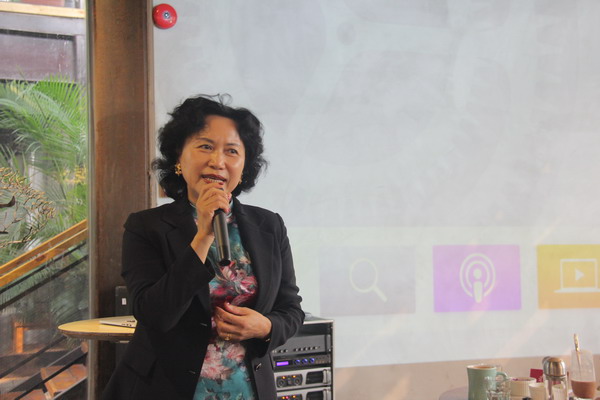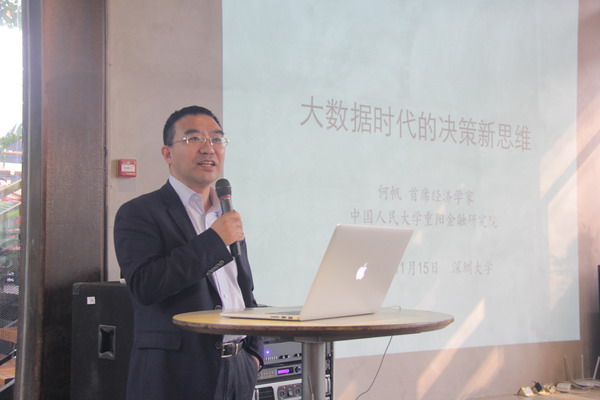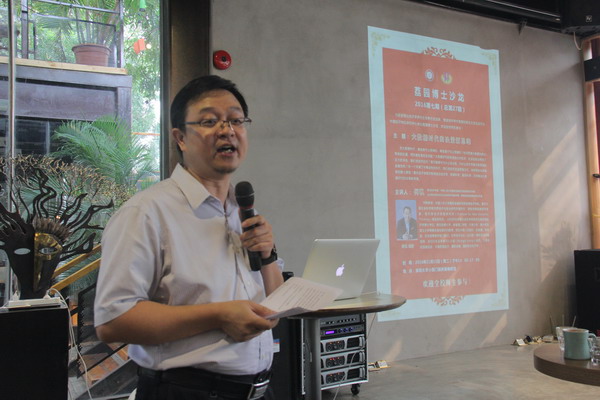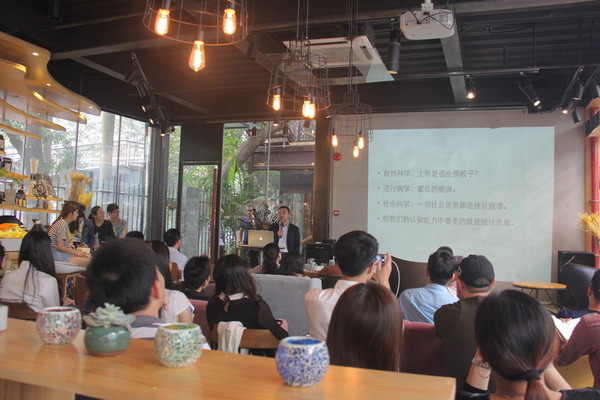On November 15, 2016, the 7th Academic Salon for Ph.D. Students in Theoretical Economics in 2016 (the 27th in history) was held by the China Center for Special Economic Zone Research (CCSEZR), Shenzhen University (SZU) at Maoshuli café near the West Gate to SZU. The academic seminar was attended by the invited Prof. He Fan, chief economist at Chongyang Institute for Financial Studies, Renmin University of China, Prof. Tao Yitao, vice secretary of CPC committee and secretary of the Discipline Inspection Commission of SZU and director of the CCSEZR, Prof. Zhong Ruoyu, chairman of the seminar and assistant to the director of the CCSEZR, Prof. Liu Weili, and a number of teachers and post-doctoral, doctoral, and master students.
The academic salon kicked off with a speech by Prof. Tao Yitao who, on behalf of the CCSEZR, SZU, warmly welcomed Prof. He Fan’s presence at the academic seminar. Following the speech, Prof. Zhong Ruoyu gave an introduction to Prof. He Fan’s academic profile.
Prof. He Fan delivered a report titled “New Decision-making Mindsets in the Era of Big Data”. He believes that IT revolutions enable unlimited storage and instantaneous computing of data and that everything from numbers, accounts, words, and images to positions and social relationships can be digitized. To support his theory, he cited two examples to highlight how correlations of data can be used to substantially improve our life quality and competitiveness. One of them is the wine quality predictions made by economics professor Orley Ashenfelter at Princeton University by using data, and the other is to find a potential baseball star in the film Moneyball by using statistical data to analyze and place value on the players. He then pointed out that a few laws of thought is taking shape in the era of big data: the first is that we might not necessarily know “why” but we can know “how”, which means that we should look for non-linear correlations instead of linear causalities; the second is that we should understand that vendors know our consuming behaviors better than we do as there is sheer price discrimination in big data; the third is that experts will no longer enjoy a favorable position in information due to big data, exemplified by Google’s automatic translation team, Quiz Show, and quantitative investment. Meanwhile, Prof. He Fan also revealed under what circumstances big data could be misleading. We believe that knowledge can improve our accuracy, but as knowledge keeps growing, its marginal utility is surprisingly diminishing. Also, an excessively large amount of knowledge will hamper our predictions. Therefore, Prof. He suggested that we should prevent big data from misleading us through systematic risk prevention and innovation of mixing and matching.
In closing, Prof. Zhong Ruoyu presented a brief summary. Traditional economics relies on a few simple assumptions for logical deduction, and classical and neoclassical economics theories also make highly simplified and abstract assumptions of human behaviors. As a theory goes that everything under the eyes of the god can be traded, Prof. He Fan firmly believed that everything can be digitized. Also he revealed that with big data, analysis on human behaviors will progress from simple to complex and human behavior predictions is an inter-disciplinary integration of system science, data science and economics.
During the discussion session, the teachers and students present at the seminar vigorously interacted with Prof. He Fan by raising questions and exchanging ideas, especially on the topics such as “rational” economic man and RMB appreciation. Prof. He Fan patiently answered each of the questions and students gained a lot from this interaction. Finally, the seminar was concluded in a lively atmosphere of discussion.
(Correspondent Zhang Chao)







